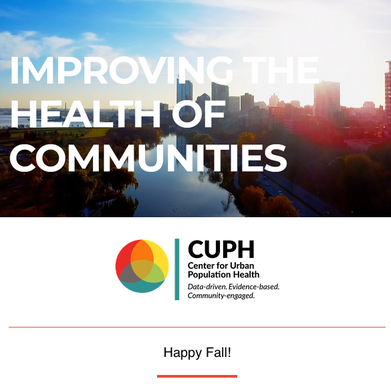Initiated in 2001, the Center is made up of faculty and staff from UW School of Medicine and Public Health, UW-Milwaukee and Advocate Aurora Research Institute. We are co-located and work together based on project needs and expertise.
How We Create Impact:
We are grounded in a population health framework. It is estimated that clinical care contributes only about 20% to an individual’s overall health. Where one lives, learns, works and plays is increasingly recognized as having a much greater impact on an individual’s length and quality of life. These health factors, also known as social determinants of health, reflect a growing area of interest, research and investment in community health improvement.
In this framework, we approach our work systematically to:
In this framework, we approach our work systematically to:
IdentifyWe work with partners to identify the determinants of health, disease, and well-being in populations.
|
Design and ImplementWe partner with faculty and community partners to design and implement preventive or treatment interventions.
|
MeasureWe also work to measure the interventions effectiveness against health outcomes of a community.
|
Engagement
|
We believe that those who experience the barriers or challenges are best situated to guide solutions. Engaging people is the best way to ensure that research and solutions are built to succeed.
We engage:
We meet people where they are-in clinic, schools, organizations and at home. We place great value on shared learning, capacity building and creating environments for personal and organizational growth. We believe in this for our staff, partners and the community. |
News
|
Evolving Patient Navigation - In and Out of Health Care
We have been fortunate to have partnered with a variety of organizations in Milwaukee to explore different models and have benefited from low turnover (average tenor is 9 years) in our team to bring organizational learnings along the way. One of the things we have learned over the years is that meeting people where they are and addressing their needs when they are ready is health equity, and everyone benefits.
Take a look, below, at a brief history of our journey of partnerships to help navigate and connect patients to resources to meet their social and economic needs. Read full newsletter. |














